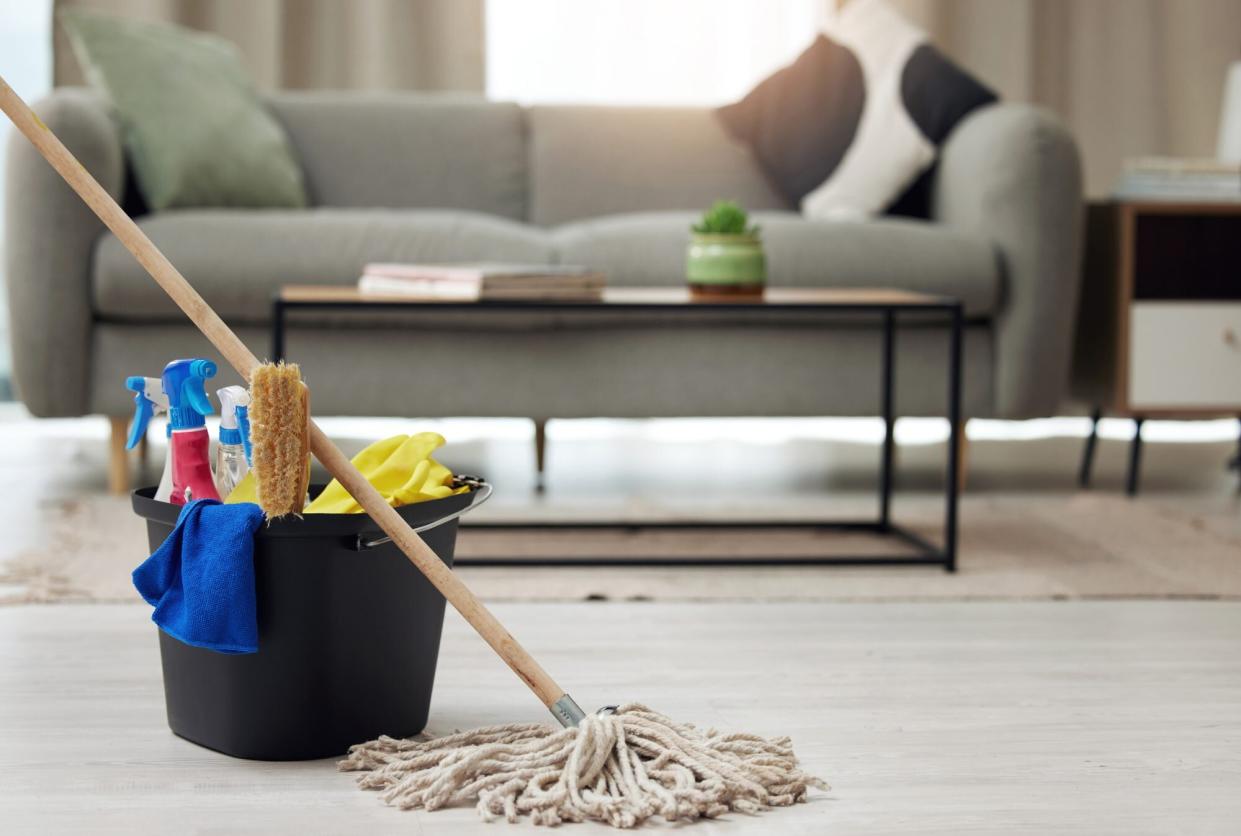8 Mistakes You May Be Making When Cleaning Your Floors

Getty Images
We'll say it: cleaning floors is not exactly our idea of a good time. You have to sweep or vacuum, move the furniture, lug out a bucket of water, and scrub scrub scrub until the linoleum shines. The best thing you can say about it is that it burns calories and that it makes your house feel so much fresher. But what if it turns out you were doing a bad job and somehow making your floors worse? To avoid that cleaning nightmare, we turned to three experts to help us keep our floors spic-and-span the right way.
1. Not Prepping Your Floor Well Enough Before Mopping
"When it comes to cleaning floors, it's essential to create a plan before you start cleaning," says Vera Peterson, President of Molly Maid. Peterson says you should make sure the room is free from any pets and move any furniture and area rugs away from the areas you'll need to clean. The first step is to always vacuum or sweep thoroughly. Pay attention to high-traffic areas like doorways and hallways, but don't forget about hidden spots like under furniture since that's where small rocks, pet hair and dirt often are lurking. You should also pay attention to any sticky substances on the floor. She also recommends using an ice cube to freeze stuck-on gunk, then scrape off with an old credit card. Mopping your floors is the best way to get rid of dirt and grime, but it needs to be started when the floors are ready.
2. Using Excessive Steam or Water
"Even though steam is one of the best and most harmless tools for cleaning, some types of floors (mostly hardwood) do not get along with water," says Alessandro Gazzo from Emily's Maids, a house cleaning & maid service in Dallas, Texas. "You can use water or steam but only after you've checked that the type of floor you have is resistant to these products."
3. Not Knowing Your Flooring Well Enough
"One of the most common mistakes is to clean the floor without thinking first about the material," says Alex Varela of Dallas Maids of Frisco, Texas. "My piece of advice would be to do some research on the exact material you're working with. Some materials, like [wooden floors] are extremely sensitive. Using the wrong cleaning product or technique can cause stains, decoloring, or even mold. Materials that come from mineral or plant sources—linoleum, hardwood, granite, bamboo—should be cleaned with specialized products. " Varela notes that the same is true for natural stone countertops, such as granite or marble.
4. Over-Saturating Floors
"You should never saturate wood floors with water, so it's important to wring the mop each time you dunk it in the cleaning solution," says Molly Maid's Peterson. "You should aim to do this every time you finish a four-foot-square section of floor. It's also important to replace your cleaning solution every time you move to a new room."
5. Not Cleaning Your Mop Properly
"Before mopping, make sure you are rinsing the mop in the sink with hot running water to loosen any debris from last time you cleaned with it," says Peterson. "Work the mop in an 'S' motion, leading with the same edge every time to capture debris instead of just spreading it around the floor."
6. Using the Wrong Cleaning Products
"I would advise against any products with bleach or ammonia, which are too abrasive," recommends Gazzo. "Instead, use more neutral items such as soap or baking soda. However, it's best to use specialized products formulated for that exact type of floor."
7. Leaving Streaks on the Floors After Cleaning
"If you have a glossy surface on your floor, make sure you are finishing your floor cleaning with a clean cloth wrapped around the end of the squeezed-out mop to avoid streaks," suggests Peterson.
8. Using the Exact Same Cleaning Process Every Time
"Some types of floors require regular cleaning and then occasionally, either deeper cleaning or other types of maintenance," explains Gazzo. "For example, hardwood floors require moisturizing with products that are able to moisturize, not necessarily clean. They will keep the humidity at the exact level that it should be. For example, you might need to clean your floors twice a month, and then take a different strategy every 3 to 4 months."

